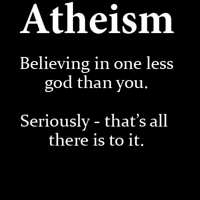
Many of us, including some fairly open atheists, are less than thrilled with the prospect of being publicly identified as atheists in some contexts. Suppose you are quoted in a newspaper article about the importance of separation of church and state and the reporter writes something like, "John, who claims to be an atheist, thinks that..." You know that this will almost guarantee that those you were hoping might be reached by the article are going to tune you out and dismiss whatever point you might have been making. This needs to change, and I have some thoughts on at least some options for how we might change it.
Nature of the Problem
"Atheist" has extremely negative connotations, and there are many reasons for this that are going to be difficult to change because of their long historical basis. One of the most common and important sources of the negative associations with atheism - which should also be the easiest to modify - is due to the widespread misunderstanding of what atheism means.
Many religious people (and a disappointing number of atheists who mistakenly label themselves agnostics) believe that atheism requires 100% certainty that gods do not exist. They do not understand that atheism requires no such certainty, and they often confuse the meanings of both atheism and agnosticism.
This mistake leads those who make it to equate atheism with religious extremism. They see atheists as the polar opposite of religious extremists, regard both as too extreme, too adamant, and too certain. Thus, the moment you or I are identified as an atheist, we become "militant," "radical," or "extreme." We can then be dismissed, often before we are heard at all.
Solutions
The main solution I have in mind requires us to educate the public about the meaning of atheism and how it says nothing about certainty. But since "the public" is an awfully large group, I suggest that we focus our initial efforts on doing this with two groups in particular:
- Other atheists
- The news media
When you see your fellow atheists misunderstanding atheism, correct them. Point out what atheism means and explain that it makes no claim to certainty. Too much damage is being done by misinformed atheists who are unintentionally feeding public misconceptions by promoting falsehoods.
As for the news media, I am reasonably confident that a consistent and coordinated effort on our part can bring about change; however, that doesn't mean it will be easy. Whenever we see a story misrepresenting atheism, we should leave comments noting the meaning of atheism and addressing the issue of certainty. Contacting the author directly can also be helpful. Most are not doing this deliberately; they simply do not know any better.
Conclusion
Being publicly identified as an atheist - or identifying oneself as an atheist - would be far more pleasant if the public understood the meaning of atheism. We have a vital role to play in promoting an accurate understanding of atheism and correcting misconceptions. By doing so, we can make a real difference in the experience of all atheists.